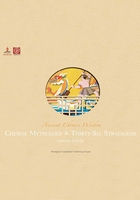
嫘祖的故事 (léi zǔ de gù shì)
Tale as Smooth as Silk
In ancient times, people didn’t know how to make clothes out of cotton or other refined materials, so they covered themselves with animal hides, leaves or tree bark.
Such primitive apparel was not replaced with more comfortable and better-looking clothes until the arrival of the Goddess of Silkworm.
The goddess was originally a pretty and kind-hearted girl living in a place called Xiling in southwest China.
Unfortunately, both her parents were ill. So, the girl had to go out every day to gather wild fruit to feed her parents. But soon, she could not find any more fruit around her home and she had to travel longer distances to feed the family.
Every day she got up before sunrise and came home after sunset. But after a few months she could no longer find more food in those distant areas.
She was so worried she would not be able to feed her parents that she began to cry under a mulberry tree. Her cry was extremely sad and heart-wrenching. When the Jade Emperor in Heaven learned about the story, he felt great commiseration for this pious girl. So, he turned a deity into a worm to reside on the mulberry tree under which the girl was crying.
The worm dropped some mulberry into the mouth of the girl, who found it both sour and sweet. When she realized that mulberry was edible, she was delighted and gathered some for her parents every day.
That summer, the divine worm began to spit silk and build a cocoon.
The girl found the cocoon extremely pretty in the sunshine and she started to draw out the silk and weave it into a piece of fabric.
When she had woven two large pieces of silk cloth, she gave them to her parents to wear. The silk cloth was smooth and comfortable. It felt cool in the summer and stayed warm in the winter. So, the girl picked some worms from the mulberry tree and began to breed them at home. She called the worm can.
After she accumulated some experience breeding the silkworms and making silk fabric, the girl taught other people the skills. And soon, local people began to wear beautiful and comfortable silk clothes instead of tree bark and animal hides.
The Xiling king was happy about the girl’s invention, so he adopted her and decided to give her a new name Leizu.
Later, Leizu married the Yellow Emperor (2717-2599 BC) and helped him unite China. She also encouraged the emperor to spread sericulture across the country.
Since then, Leizu has been worshipped by Chinese people as the Goddess of Silkworm.
Every spring, people in especially the southern areas of the country still hold grand ceremonies to offer sacrifices and pay homage to Leizu before they begin planting mulberry trees and breeding silkworms.
